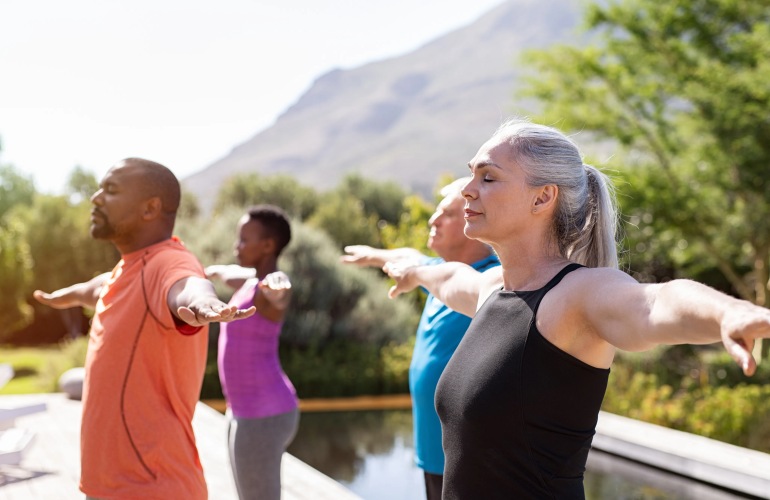According to Gandhi, “Health is the real wealth, not gold and silver.” A lovely sentiment, and very Gandhi-ish.
On the other hand, Mark Twain took a different approach, saying, “The only way to keep your health is to eat what you don’t want, drink what you don’t like and do what you’d rather not.”
When it comes to the 21st century’s expanded definition of wellness, it appears they are both 100% correct. Yes, our overall wellness is essential to living our best lives and hinges on our physical, mental, social, emotional, intellectual and environmental wellbeing. And yes, sometimes supporting that wellness means making more disciplined life choices.
According to the International Council on Active Aging (ICAA), “wellness is derived from our ability to understand, accept and act upon our capacity to lead a purpose-filled and engaged life. In doing so we can embrace our potential.”
Reaching beyond Gandhi and Twain’s vision of health, the five dimensions of wellness involve balancing all areas of life to support the active pursuit of what we love. As you embark upon a truly satisfying and rewarding active adult life, consider these essential wellness elements a framework for ultimate senior health and wellness.
Emotional Wellness
Emotional health is the cornerstone of happiness and a critical component of wellness for the elderly. Understanding our feelings and responding to them appropriately helps us create healthy relationships with others. Sharing feelings with other seniors who face the same challenges of aging can help support emotional stability.
Intellectual Wellness
A mind is a terrible thing to waste. Staying engaged and active mentally is a proven approach to keeping our brains sharp. There are so many options for stimulating the mind. Take a college course to learn something new, write a journal chronicling your past, pick up a paint brush, join a senior theater group, get into a card game or simply pick up a crossword puzzle book. It’s all about exercising that muscle between the ears to keep it strong. Use it or lose it. Simple as that.
Physical Wellness
Physical wellness is the key to independence. Lifestyle choices that keep us physically fit include exercise, healthy diet choices, adequate sleep, managing stress, quitting smoking, limiting alcohol, and being proactive about medical care. Or as Mark Twain said, doing things you don’t want to do!
Professional Wellness
The feedback we get from using our professional skills contributes to our confidence and self-esteem. Retirees may no longer get paid for their services, but can achieve personal satisfaction by lending their expertise as mentors, teachers and volunteers. You can maintain your skill set while experiencing the satisfaction of helping others.
Social Wellness
Isolation is the enemy of senior wellness. Social interaction with family and friends is essential to a successful active adult life. If your neighborhood no longer provides social opportunities, consider becoming part of an active adult community where all your neighbors are friends just waiting to be met. Get involved in clubs and classes and enjoy creating new and meaningful relationships.
Spiritual Wellness
Spirituality means different things to different people. Wherever you find your spirituality, it is an essential piece of the wellness puzzle. You can seek out group or individual faith-based activities or practice personal mindfulness meditation like yoga or tai chi, or just commune with Mother Nature when the spirit moves you.
Environmental Wellness
Environmental awareness is the gift that keeps on giving. Living a “greener” life and supporting good stewardship of green spaces for future generations is great for you and the planet. This is not to mention the joy and peace of mind that comes with spending time surrounded by the beauty of nature.
If Gandhi and Twain had a chance to achieve a 21st century understanding of wellness, no doubt they would finally agree on something: Wellness for the elderly is a complex concept that embraces the sum total of who we are and who we aspire to be.
